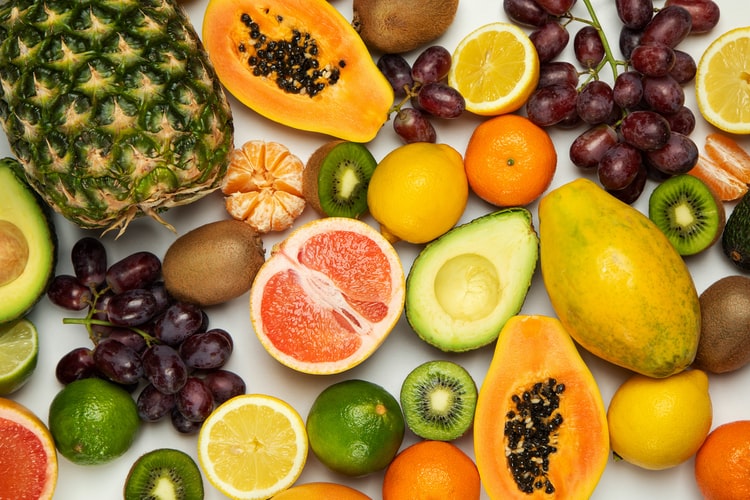If you are a dog lover, you definitely want your furry buddy to live with you for as long as possible. Spending quality time with your pet is beneficial for both of you. So you should do your best to ensure your pup lives a healthy and comfortable life.
On the link below, find more information about the benefits of being a dog owner: the-10-health-benefits-of-dogs-and-one-health-risk
The basics of a healthy and long life for your pet are a healthy diet, moderate activity, and timely response to illness. While some of these may not always be pleasing to your four-legged friend, you need to do it for a higher purpose.
Dogs know how to take care of themselves, to some extent. But most of their maintenance is up to you. It means that you must provide your pet with quality and balanced meals, regular vet checkups, proper care in case of illness, etc.
Is Fruit Intake Necessary?

When you have the right information about your dog’s nutritional needs, you know how to organize their daily menu. Fruit, although an excellent source of vitamins and minerals, should not dominate your pet’s diet. The daily caloric intake from these foods should make up only one-tenth of the total number of calories.
Also, you need to know that not every fruit is good and safe for your pet. For example, citrus fruits are generally not recommended for dogs, but oranges are an exception. By following a few do’s and don’ts, you can give your pet this fruit as a refreshing and delicious treat.
Raw or Processed Fruits

Fruit can be used in the diet in a variety of ways. Still, you get the best out of it when you give it to your pet fresh, without any processing. Thus the nutrients in it remain intact and maximally usable. Slices of fresh oranges are juicy, sweet, and represent a real refreshment.
But don’t limit your furry buddy to just a couple of slices a day. Sure, this amount should not be exceeded, but you can change the way you serve an orange to your pup. For example, you can cut this fruit into cubes and mix it into their meal. Or you can use the juice as a salad or meat dressing or in addition to homemade dog biscuits. You can go now to the store or squeeze fresh fruits.
It’s not recommended to use processed or canned oranges. Since these citrus fruits already contain a lot of sugar, any way of preserving them would only increase the amount of sugar in them, which is not good for dogs. Excessive intake of simple sugars quickly raises insulin, which in some situations can lead to blindness. So both oranges and their juice have to be fresh or freshly squeezed (not store-bought).
Peeled or Not

You may not have known, but most of the citrus acid in oranges is found in its peel. Numerous nutrients are also stored there, while the flesh is rich in fiber and water. Orange peel, when washed well, can be safely used in human nutrition but not in dogs.
If you want to give your pet some fresh oranges, they have to be peeled and seed-free. Any of these two represents a choking hazard for your pup. Also, the peel can cause digestive issues because it is difficult to digest. Still, don’t give up too fast from this orange part.
You can use orange peel in baked homemade biscuits or biscuits for your dog. Thorough washing is a must because the peel often contains chemicals and dirt. A zest or two will give any baked treats an extra burst of citrus flavors. Other citrus fruits are not desirable because they have a higher level of acid.
Don’t Exaggerate
While excessive fruit intake in humans may not cause problems, it has a different effect on dogs. Their bodies are capable of producing certain vitamins, such as vitamins A and C, in certain amounts. That’s why your four-legged pet doesn’t crave oranges.
If you give your pet too much citrus, you can expect a few problems other than an upset tummy. First, citrus acid can cause gastritis, indigestion, but also intestinal problems. The same is the case with excessive fiber intake. In optimal amounts, this macronutrient cleanses the body and helps remove toxins. But when your dog eats too many fibers, stool problems are possible.
Too much vitamin C can induce kidney problems. Although this nutrient is known as an antioxidant, excessive amounts alter the acidity of your pup’s urine. In the long run, that can cause kidney stones. Sometimes, eating too many oranges will cause a urinary blockage in your pet.
Intake of natural sugars won’t harm your dog. Still, no sugar-rich fruit like oranges is a good choice if your pet has excess weight or suffers from diabetes. It is not necessary to completely deprive them of this fruit due to the general health benefits. But the intake must be as limited as possible, only up to a whole orange once in two weeks.
In healthy dogs, there are generally no barriers to eating oranges. Whether you opt for fresh fruit or prepare an orange taste dish, you can be sure that your four-legged friend will enjoy it. Maybe the zesty aroma will surprise them a bit if they eat oranges for the first time. But rest assured that your pet will soon fall in love with this fruit.
Read Also:




























